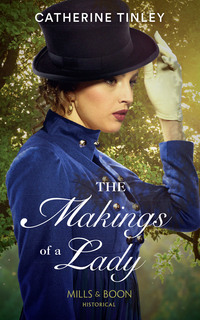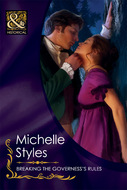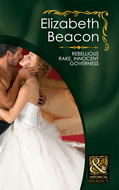Kitap dosya olarak indirilemez ancak uygulamamız üzerinden veya online olarak web sitemizden okunabilir.
Kitabı oku: «The Makings Of A Lady», sayfa 3
Chapter Three
Jem relaxed in the now-cooling bath, the scent of lavender and marjoram filling his senses and easing the throbbing in his old wound. He had dismissed the footman, needing solitude to relax and think. His leg rarely pained him now, but being stuck in a jolting, leather-slung carriage for most of the day had brought back the old ache.
Other old aches had been reawakened this day, and with unexpected force. Olivia—Lady Olivia—had blossomed into a stunning woman. He closed his eyes. There she was, in his mind’s eye, serene and elegant. Her beautiful face, glossy dark curls and intelligent grey eyes were just as he’d remembered, but there was a new quality about her that he assumed could only be self-assurance gained in the years since he had last seen her.
He had not expected to react so strongly to her but, he reasoned, it was perfectly logical, given the way he had made her the focus of his dreams these past four years. Those dreams were not and had never been real—they were fantastical only, designed to help him cope with the loneliness of his overseas posting.
He had spent most of his time in Australia with soldiers and outlaws and, surprisingly, he had not taken long to adapt to the basic—and hard—life in one of the remotest parts of the world. Their fort, which included a prison for outlaws along with the village that had sprung up nearby, was surrounded by fifty miles of emptiness in all directions. Living conditions were basic, diversions were few, and they had all been relieved when occasionally called to one of the settlements further down the coast to take their turn at ensuring public order and supporting the local government officials.
Jem had gradually been offered more and more responsibility, as his commanders had come to appreciate his qualities as a leader. They had genuinely been regretful at his decision to sell out of the army, following the news of his inheritance. They had, of course, understood and wished him well, but he had been pleased to discover that, had he stayed, they had seen in him the potential for high office in the future.
He stood, allowing the cool, herb-scented water to run off him for a moment, before stepping out of the bath and reaching for the soft towels provided by Chadcombe’s staff.
Did Olivia arrange this bath for me? he wondered, as he towelled himself dry. Or was it Lady Shalford?
He was still getting used to the blessings of civilian life, but being able to bathe in warm water, and with privacy, was a profound luxury.
Or perhaps they do this for all their guests?
Chadcombe was a huge mansion—more like a ducal seat or a royal palace than an earl’s establishment—and Jem was struck anew by the gap in station between him and Lizzie, and the Fanton family. Yes, he himself was a gentleman, like Harry, and, yes, he had come into a sizeable inheritance. But there the comparisons ended. He was not sure any gentleman’s residence could compare to Chadcombe, and his lack of title was also a crucial point of difference.
Although Harry and the Earl had both married heiresses, their fortunes had apparently not been known about at the time. He was sure the Earl would encourage Lady Olivia to make an advantageous marriage—that she was twenty-two and yet still unwed was telling. During those long four years, each time a letter had arrived from Lizzie, he had unconsciously expected it to detail Lady Olivia’s betrothal, or her marriage. Most young ladies were betrothed by the end of their second Season, so when Olivia remained unwed after four years, he had gradually hit on the most likely explanation. Quite simply, he reasoned, no one was good enough for her.
The young girl he had known had not been prideful or self-important but, equally, she had been blithely unaware of the privileges she enjoyed. No door was closed to her. She made friends everywhere she went. At eighteen, she had enjoyed all the advantages of wealth, position and connections.
For her to accept a betrothal, no doubt her suitor would have to pass a number of tests set by the Earl and unconsciously endorsed by Olivia herself. For how could she be expected to consider someone who had neither title nor fortune? Such was, he knew, the way of the world. He understood this without rancour or bitterness. Although his situation had improved a hundredfold in four years, yet still he was beneath her touch. He must not forget it.
Not that he had any particular designs on the lady. He had enjoyed her company during his convalescence and had—not unnaturally—developed some warm feelings towards her. They had, after all, been thrown into each other’s company on a daily basis. He laughed a little as he recalled actually believing he had been in love with her. He had been so young back then!
His task now was simply to find ways to be unperturbed in her company, without the undercurrents of old memories or the fantasies of a soldier starved of female company. He would be polite and warm, and at ease.
‘Would you do me the honour, Lady Olivia, of showing me some of these beautiful gardens?’ Jem waved a hand towards the window, where indeed the prospect was delightful. ‘If you are not otherwise engaged, that is?’
They had just breakfasted and Adam had left them to begin his work for the day. Most of the household were still abed—both Jem and Olivia were renowned early risers. Even as Olivia politely agreed to Jem’s request, part of her was, with some sadness, remembering their habit of walking together in the garden in London immediately after breakfast.
Olivia had come to love those walks together during his convalescence—he struggling but determined to master his mobility, she cajoling and challenging him, bearing his frustration and elation with equanimity. As the time went on and his walking became easier, they had talked of many things—his childhood in the north of England, his sister Lizzie, who was to visit him in London, some of his experiences in the army, his hopes for advancement once his injury had healed.
He had not discussed Waterloo, the horrific leg injury he had suffered during the battle, nor how it had come about. Harry must know, but he never talked of it either. Adam had hinted her away from questioning them and, ever sensitive, Olivia knew better than to push either of them into reliving experiences they were trying to forget.
During those weeks, Olivia felt she had come to really know Jem and to feel comfortable in his company. Well, she recalled ruefully, as comfortable as one could feel with someone for whom one had developed such strong feelings.
But had she ever truly known him? She had not for a moment anticipated he would reject her so comprehensively, or that he would disappear so completely, uncaring of the devastation he was leaving behind.
He had been ever the gentleman, she acknowledged. Never had he spoken of love, or tried to kiss her. But his eyes had warmed when he looked at her and she foolishly had believed he had cared for her. How wrong she had been!Afterwards, she wondered if he had seen her as a child, which had of course offended her eighteen-year-old dignity. But I was a child, she reflected now.
Again her mind returned to that last day. Through a haze of tears she had watched him walk away, unable to fully comprehend that he was really leaving. Little did she know then that would be the last she would see of him for four long years.
It was for the best, she reminded herself fiercely, because now I am free of my old feelings and can be easy in his company. Perhaps—maybe—I could even be his friend. After all, he is Lizzie’s brother and I shall no doubt be forced to see him from time to time. Yes, I can be friendly, she decided. I must put aside my girlish foolishness and the anger that came from hurt pride.
Chadcombe had extensive gardens, from formal squares and ponds laid out in the French style to contrived wildernesses and a well-developed rose garden behind the ballroom terrace. She and Jem wandered through the archways and walks of the garden, the early flowers budding and unfurling in a promise of the glories of colour yet to come. Olivia had taken particular care with her dress today, opting for one of her favourite embroidered muslins, this one with a pretty yellow taffeta ribbon. She told herself she had done so because of Lizzie’s visit. There was no other reason.
‘I see Lizzie is just as much a night owl as ever!’ offered Olivia politely.
‘What? Oh, yes, yes, quite!’ said Jem. Olivia frowned. What was wrong with him? Unable to account for his distractedness, Olivia lapsed into silence, unsure of what to say.
This was unexpected. Having successfully passed the test of seeing him again, of spending an evening in his company and enduring an entirely restless night—or so she believed—she had emerged this morning with a determination to maintain a distant, friendly air with him. It was vital that he understood she was no longer an infatuated girl. But she had not thought properly about the fact that, as much as she had changed in four years, so also would he. Gone was the open, friendly youth who had so enjoyed her company four years ago. In his place was a stranger and one whom she could not read. At all.
They walked on a few yards more and found themselves at the Fountain of Eros in the centre of the garden. The air was still and the sky cloudy and dull. A wren called sweetly from a nearby branch. Jem stopped walking and turned to face Olivia directly.
His expression was grave, worried. Olivia’s heart sank. It reminded her of his appearance in the London garden, when he had said the words that had broken her heart.
Jem was in a quandary. His plan to be calm and easy in Olivia’s company had fallen completely flat. Last evening, and earlier at breakfast, he had been intensely aware of her, compelled to keep looking at her, and frustrated by his own lack of self-control. This old passion was proving difficult to conquer!
Give yourself time! he had told himself, even as he’d invited her to walk with him. Familiarity will help you see her differently.
As they walked, he was conscious of memories of those other days, in that other garden. The feelings from back then were once again flooding through him, like a Pandora’s box of unwanted emotion. His mind, too, was awhirl. In particular, he was wrestling with a topic that had occupied his mind obsessively during his long voyage to the Antipodes and for quite some months afterwards. What if I was wrong about her?
Soon after his arrival in the Fanton townhouse, Jem had heard Harry tease Olivia about a tendre she had had for a poet a few weeks earlier—just before Harry had left for Waterloo. The poet, it seemed, had professed his undying love for Lady Olivia, expressing his passion via some excruciating verse, and Olivia had, it seemed, quickly outgrown her infatuation. Harry—then a master in the game of flirtation—had advised Olivia on how she could gently discourage the young poet while avoiding unnecessary drama.
Blushing a little at Harry’s teasing, Olivia had confirmed that her feelings for the dashing Mr Nightingale were not what she thought they had been and that, yes, he had gradually responded to her gentle hints by transferring his attentions to another young lady. This lucky damsel had that week received a sonnet to her Glorious Shoulders.
They had all laughed, not unkindly, but Jem had been left with the impression that Olivia was extremely young and untried, and that it would be a long time before her heart would engage in anything deeper than a passing notion.
She will fancy herself in love a dozen times, he had thought.
So when she had, soon afterwards, occasionally looked at him with admiration in those beautiful grey eyes, he had known not to refine too much upon it. Especially when he himself had been struggling to resist an unlooked-for and inconvenient attraction to her.
But what if he had been wrong? What if she had actually developed a deeper attachment to him at the time? His heart leapt in the old way at the thought.
Be sensible! he told himself. These were the same agonies that had haunted him throughout his stay at the Fanton townhouse. Knowing she was not for him, yet helplessly obsessing about her, while continually reminding himself that she would forget him as quickly as she had forgotten the poet. Around in circles he had gone, day after day, night after night.
He shook himself. Even if her tendre had, in fact, been deeper at the time than her feelings for the unfortunate poet, after four years he would have been long forgotten.
His dilemma, however, was this: Should he apologise to her? He had done nothing to discourage her girlish regard at the time. He had continued to enjoy her company—in truth, he was unsure how well he would have managed his recovery without her encouragement and challenge. He had selfishly taken advantage of her healing company and had failed to discourage her attentions. He was only slightly older in years, but even then, he had been much more worldly-wise than she. And then he had vanished with sudden finality.
If his actions four years ago had caused her any hurt, then to apologise would be the gentlemanly thing to do. On the other hand, if he was wrong, it might cause awkwardness or confusion. And—did he really wish to know the truth? Had she forgotten him instantly, moving on to the next handsome suitor that caught her girlish fancy? How much of her warmth at the time had been fuelled by pity, or foolish romantic notions of a wounded soldier?
Or had she, like he himself, remembered their time together afterwards with rather more intensity than expected? She was, of course, unaware of the foolish devotion that had stayed with him all the way to Australia and had lingered for a long time afterwards. Raising the topic of their old friendship—and his abrupt departure—might give him an inkling of whether she had ever thought of him afterwards.
Yes, he thought. I do want to know the truth.
Mental excuses about apologising or being gentlemanlike were simply that—excuses. He felt compelled to know how she would react if he mentioned their former friendship. He refused to consider why that might be.
Without further deliberation, he decided to throw caution to the four winds. ‘Olivia!’ he said. ‘There is something I wish to say to you.’
Olivia studied his face carefully. He looked unhappy—slightly cross, even. She could not recall ever seeing him like this. How he had changed! She swallowed. What was he about to say? Was it something to do with Lizzie?
Whatever it was, she would remain polite, friendly and serene.
She sat on the edge of the small pool at the base of the fountain, folded her hands in her lap and waited. He looked at her, his jaw set, then looked away. Having paced up and down for a moment, he seemed to gather himself, then turned to her again. His blue eyes seared into hers.
‘I debated whether to speak to you at all. To be a gentleman is difficult at times—knowing the right thing to do or say may not be obvious.’
Olivia was lost. What on earth is he talking about? ‘Whatever it is, Jem, you need not fear me. Although we have not seen one another for many years, I feel as though we have been friends through Lizzie for a long time.’
He stilled, then ran a finger around the inside of his neckcloth, as if he found it too tight. ‘Friends. Yes.’ He frowned. ‘Friends. And therein lies my difficulty. For how could I—?’ He broke off and completed another bout of pacing. ‘Olivia, do you remember when I first came to live with you all in London, after Waterloo?’
She swallowed, but managed a bright smile. ‘Of course! Harry did right to insist that you convalesce with us. And frankly, I am glad of it, for otherwise we should not have met and I would never have known Lizzie, who is now my greatest friend. And I hope we can also be friends.’
‘Again, friends!’ Sitting beside her, he picked up her hand. Olivia felt a familiar thrill go through her at his touch—a thrill that only he had ever caused. Stop it! she told herself. Jem is trying to tell you something important to him. Now is not the time to be distracted by an old attraction that cannot be.‘When we met,’ he said earnestly, ‘you were but eighteen and the sister of my commanding officer. I was a wounded junior officer with no real prospects and little money. Harry had done me the honour of offering me hospitality at a time when I was in desperate need of it. Without him and Juliana, I might have been billeted in a tent or hotel in Brussels for months after the battle.’
‘I remember.’ Olivia shuddered. ‘That would have been terrible, for you might not have recovered so well.’
‘I am sure of it,’ confirmed Jem. ‘Although the journey to London was difficult, I am glad Harry insisted on it. You and the rest of the family were so welcoming, taking a stranger in and treating me with such kindness.’
‘You became part of our family, Jem.’ Olivia was trying to sound reassuring. Was he, four years later, still feeling guilty about their hospitality towards him? She tried to think of how best to comfort him, without reminding him of her old infatuation. ‘Why, for all that we have not seen each other, you are like a brother to me, and Lizzie a dear sister!’ The warmth of his hand was making her nerve-ends tingle and causing all manner of distracting feelings in her stomach, so Olivia gently extracted her hand, under cover of patting his arm reassuringly, in a sister-like manner.
He looked down at her hand on his arm. When his eyes returned to meet hers, the expression in his was guarded.
Olivia was overcome by confusion. Why was he talking about four years ago? Did he—did he know he had broken her heart? Lord, she hoped not! She summoned the old anger, that sense of betrayal she had felt at the time. But, now that he was beside her, a full six feet of gorgeousness, it was hard to be angry. Instead she knew only confusion and uncertainty, and the compulsion of his blue, blue eyes.
She gathered all her strength. ‘I am listening, Jem. Whatever it is, you can tell me.’
He stood, raking his hand through his thick, dark hair. ‘I think that is debatable.’
Olivia waited, all her attention focused on him.
How fine he looks! she could not help thinking.
His strong, muscular frame gave no hint of the serious injury he had sustained, which could have resulted in him being permanently crippled. Now he moved fluidly, pacing again before her. Through her eyelashes, and trying not to be obvious about it, she studied his striking form—slim, muscular legs encased in fine pale breeches and gleaming Hessians, a lithe, wiry torso hinted at beneath an elegant waistcoat and a form-fitting blue jacket. Oh, but he was a joy to behold!
He stopped now and looked at her again. Disconcerted, she blushed slightly, hoping there was no way he could read her thoughts. She looked up at him in mute question. He sighed and shook his head. ‘I apologise, Olivia. I am wool-gathering today and it seems I have nothing to say to you after all.’
She looked at him doubtfully. ‘Are you certain? You seemed agitated before—I would hate to think you were distressed, when I could help...’
He smiled broadly. ‘Not at all!’ His tone was jovial. ‘Never felt better! Perhaps I need to simply stop thinking about things overmuch. Clearly long carriage rides can make me maudlin. Now, shall we walk back to the house?’
She smiled back, relieved to hear a more typical tone in his voice. ‘Of course!’ He offered his arm and she slipped her hand into it, relieved that near disaster had been averted and normality had reasserted itself.
Chapter Four
‘Do not speak to me!’ declared Lizzie, with fervour. ‘It is not yet noon and I am forced into polite company.’ She smiled to soften the words. ‘Why, I shall not be fit for conversation for at least another hour!’ Lizzie had just joined Olivia, Jem, Clara and Charlotte in the morning room. She had brought her sketchbook—Lizzie was a talented artist and often worked on her drawings and paintings during the afternoon.
‘Have you eaten?’ asked Charlotte solicitously.
‘I have, thank you.’ Lizzie leaned forward conspiratorially. ‘I confess one of your wonderful housemaids brought rolls and chocolate to my bedroom. I truly appreciate Chadcombe’s hospitality—even if you do keep inconveniently early hours!’
Charlotte was just explaining that Adam was with his steward and Juliana and Harry—who also loathed country hours—had not yet emerged from their bedchamber, when the sound of a carriage approaching up the drive alerted them to the fact they were to have visitors. ‘Oh, dear,’ said Lizzie, patting her hair, ‘and I am not long risen!’
‘You look charmingly,’ said Olivia reassuringly. Lizzie beamed at her. Oh, it was good to have her friend at Chadcombe! Already life seemed less flat. And now, it seemed, they were to have visitors as well. She peeped discreetly through the lace curtains as five people emerged from the coach. ‘Two men and three women,’ she announced. ‘Although they are too far away for me to distinguish who they might be.’
‘Do sit down, Olivia,’ said Charlotte, ‘for they might see you looking through the window!’ Olivia complied, sitting beside Jem on a satin-covered couch. She hoped Jem and Lizzie did not think Charlotte was telling her off, as though she were a child. That had not been Charlotte’s intention—dear Charlotte would not do such a thing—but, still...
They all rose when the footman announced their guests. ‘Mr and Mrs Foxley, Mrs Buxted, Mr Manning, Miss Manning,’ he intoned, his final introduction slightly muffled by the scrape of Lizzie’s chair as she stood.
Mr Manning! Olivia’s heart began to race. She stood, maintaining what she hoped was a neutral look on her face. The ladies dipped into a curtsy, the men bowing politely, then Charlotte stepped forward to greet her guests.
‘My dear Faith!’ she said warmly, embracing her cousin Mrs Foxley. ‘Aunt Buxted!’ She embraced Faith’s mama next, though with rather less enthusiasm. However, her words were warm and genuine. ‘It is so good to see you! And where is little Frederick?’
‘We have not brought him, I’m afraid.’ Faith spoke in her usual gentle tones. ‘We have left him with his nurse.’
Her husband explained. ‘We recall the last time he was here, he managed to break not one, but two tea cups and we decided that, on this occasion, we should sacrifice his company in the interests of our sanity—and your china!’
They all smiled at this. Master Frederick Foxley was just past his second birthday and had recently become, as his doting father suggested affectionately, a tyrant.
Olivia could barely follow the conversation. Her attention was fixed on Mr George Manning and her foolish heart was still pounding wildly, and in complete defiance of her wishes. She was wondering if it was obvious to everyone in the room that she and Mr Manning had met before. Oh, how she wished she had mentioned it!
He stood a little to the side, awaiting formal introduction, and Olivia’s eyes were compulsively drawn to him. How elegant he looked! His tall figure equalled Jem’s—both were handsome, imposing men. Mr Manning had a peculiar stillness that spoke of assurance and composure. His handsome face looked relaxed, though his eyes were busy, observing everyone with keenness and intent.
By his side stood a beautiful woman, with fair hair smoothed into an elegant chignon, pale blue eyes, and the most stylish silk morning dress Olivia had seen outside London. She wore a delicate lace cap, proclaiming her status as a married lady, and, unaccountably, Olivia’s heart sank. Had the footman said Mrs Manning? Was George Manning, then, married?
She was conscious of a strong feeling of disappointment. She and Lizzie had often moaned in private about the fact that so many young men’s lives had been lost in the war and that there were usually three young ladies to every eligible gentleman at the balls and routs they attended. And even then, like as not, the most handsome ones were invariably already married. With Jem here, she needed the distraction of an eligible man.
She caught Lizzie’s eye. Her friend sent her an impertinent look, arching her eyebrows to signal the presence of an interesting new acquaintance. Olivia suppressed a smile and stood still, awaiting the introductions.
Mrs Buxted obliged. ‘My dear, dear Charlotte! Lord Shalford! Permit me to introduce to you my treasured friend Miss Manning, who is lodging in Albemarle Street, and her brother, Mr George Manning.’
Her brother! Olivia’s eyes flew to Mr Manning’s face. He was watching her intently and was clearly amused by her reaction. She flushed and looked away. Jem was looking at her, a crease in his brow. Everyone else, she noted, was surreptitiously studying Miss Manning.
Olivia had erred. Seeing Miss Manning’s cap, she had assumed the woman was married. Instead, she was clearly wearing it to indicate she was no longer of marriageable age. Now aware that Miss Manning had to be older than she first appeared, Olivia looked for the signs. And there they were—subtle lines at the corners of the eyes, between her delicate brows and at the corners of her mouth. Still, Miss Manning was a remarkably beautiful woman. It was difficult to estimate her age—perhaps she was in her early forties, thought Olivia. At least ten years older than her brother.
‘...and this is my sister-in-law, Lady Olivia Fanton.’ Charlotte’s voice intruded into Olivia’s musings, but, thankfully, years of social schooling meant she had reached out automatically to touch Miss Manning’s pale, white hand.
The woman’s grasp was weak, but she murmured something appropriate with cool politeness. ‘I am happy to meet you,’ Olivia replied cordially, though, in truth, she scarcely knew what to make of Miss Manning. Briefly, an intent look flashed in those pale blue eyes and Olivia was put in mind of a swan on a lake, sailing serenely by, but with webbed feet pumping furiously beneath the waterline.
‘My brother, George,’ said Miss Manning, gesturing to him, then pausing to watch as George bent over Olivia’s hand to kiss it.
Olivia flushed and pulled her hand away, wishing she could wipe away the feeling of his warm lips on her skin. Her skin tingled pleasantly where he had kissed her hand, but it angered her that she should feel pleasure when she did not choose it.
They all sat, Jem returning to his place by her side. He was still frowning. He turned as if to speak to her, but Olivia’s attention was taken up by the new arrivals. By the time she realised he wished to say something, he had already subsided and indicated with a slight shake of his head that whatever he had intended to say was of no matter.
Relieved, Olivia returned her full gaze to George Manning and his sister. Looking at Jem was altogether too confusing. It was easier to avoid it. It was difficult enough being seated beside him and being so conscious of his nearness.
Once again, she reached for that old sense of betrayal. Jem was nothing to her now. An acquaintance. Possibly a friend. No more than that. Having George’s admiring gaze on her helped soothe the Jem-related anxiety.
Mrs Buxted was explaining the friendship between them was of recent date, as the Mannings had lived in London for only the past few months. ‘We met, would you believe, in Rotten Row, during the evening perambulation,’ declared Mrs Buxted. ‘We struck up a conversation and Miss Manning was most obliging. She was quite willing to listen to me nattering on about my daughters and my dear niece Charlotte, who is now, of course, a countess!’
Olivia squirmed a little at Mrs Buxted’s vulgar words. Charlotte, always ready to say exactly the right thing, diverted her by asking about her other daughter.
‘Oh, my dear Henrietta is well, though suffering from great tiredness. She has just written to tell me her fifth petit paquet will be delivered in the winter!’ Since Henrietta’s fourth child had been born last November, and her firstborn had just turned five, this news, naturally, caused some exclamations. ‘Oh, never worry about Henrietta,’ said Mrs Buxted, in a confiding manner, ‘she always wanted a large family.’
Faith, Henrietta’s sister, looked dubious at this assertion.
‘You will be wondering, I am sure,’ continued Mrs Buxted serenely, ‘why Miss Manning and her brother look so little alike!’ Olivia almost gasped. She had met Mrs Buxted many times, yet never failed to be astonished by her impropriety. ‘And why should you not, for I wondered exactly the same thing myself!’ She patted Miss Manning’s arm affectionately. ‘You are so fair, my friend, and your brother is so dark in his colouring, so everyone who sees you must wonder at it!’
Miss Manning’s expression did not change, apart from a slight hardening of her lips.
Perhaps, thought Olivia, the friendship with Miss Manning is not so firm as Mrs Buxted says it is.
She glanced at George Manning. He looked decidedly uncomfortable and as she watched he drummed his fingers on his strong thigh. Olivia sympathised. How uncomfortable the Mannings must be, to have Mrs Buxted talk about them as if they were not present!
‘George favours his father,’ said Miss Manning coolly, ‘while I am like our mother in looks.’
‘Are your parents also staying in London?’ asked Charlotte politely.
‘Our parents died many years ago,’ said Miss Manning calmly. ‘Smallpox.’
Great-Aunt Clara, who had a morbid fear of the disease, gasped. ‘Oh, dear, how unfortunate! I am so sorry you lost your parents, Miss Manning.’








